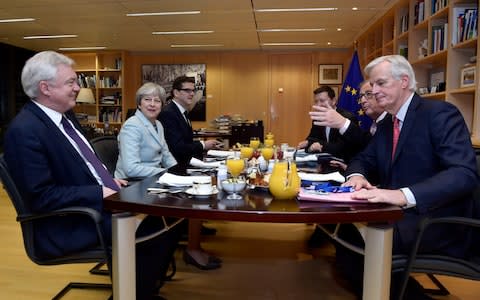'I don't have to be very clever to do my job', says Brexit Secretary David Davis

David Davis has said he doesn't have to be "very clever" or "know that much" to do his job as Brexit secretary.
The Cabinet Secretary said he just has to be "calm" and admitted that last Monday's botched attempt at getting an agreement with the European Union to move to Brexit trade negotiations had tested that ability.
Theresa May's attempt to reach a Brexit deal on the Irish border fell apart at the start of last week after a damaging public row with the Democratic Unionst Party over Northern Ireland’s future.
On an extraordinary day in Brussels, EU leaders raised expectations that a deal on the terms of the UK’s withdrawal was about to be reached, only for Mrs May to return empty-handed following a serious miscalculation over the DUP’s response to a key negotiating point.
Speaking to LBC radio, Mr Davis said: "What's the requirement of my job? I don't have to be very clever, I don't have to know that much, I do just have to be calm. And that did test the calmness a bit, a little bit."

Speaking this morning, Mr Davis said Britain's commitment to maintaining a soft Irish border after Brexit is "much more than legally enforceable".
He also claimed Phillip Hammond "slightly mis-spoke" when he said Britain will be forced to pay the divorce bill even in a no-deal scenario.
He said the UK would seek to maintain a "frictionless, invisible" border between Northern Ireland and the Republic even if Friday's last-minute agreement to allow trade talks to start collapses in the event of a "no deal" Brexit.
His comment on Sunday that the plans were a "statement of intent" was branded "bizarre" by the Irish government, which insisted an agreement that the UK will have "full alignment" with the EU on issues that impact on Northern Ireland was "binding".
But Mr Davis claimed his words had been "completely twisted".
He told LBC Radio: "What I actually said yesterday in terms was we want to protect the peace process, want to protect Ireland from the impact of Brexit for them, and I said this was a statement of intent which was much more than just legally enforceable.
"Of course it's legally enforceable under the withdrawal agreement but even if that didn't happen for some reason, if something went wrong, we would still be seeking to provide a frictionless invisible border with Ireland."

Mr Davis went on: "What we're saying is this bit of it, the bit about the full alignment argument on the issues which affect the peace process in the Belfast Agreement, we would look to that anyway because one of our absolute underpinning aims is to ensure that Ireland and particularly the Northern Ireland peace process is not harmed.
"And what's most symbolic in that is the absence of a hard border, the absence of border posts and that sort of thing.
"And we are quite certain we can do that by technical and other means even if we end up without a deal with the European Union."
Asked why he said the soft Irish border deal was a statement of intent, Mr Davis replied: "Because it's more than legally enforceable.
"In the event that the withdrawal agreement doesn't happen then we would still be seeking to maintain an invisible border between Northern Ireland and Ireland, that was the point. I was making the point it was much more than just in the treaty, it's what we want to do anyway."

 Yahoo News
Yahoo News 
